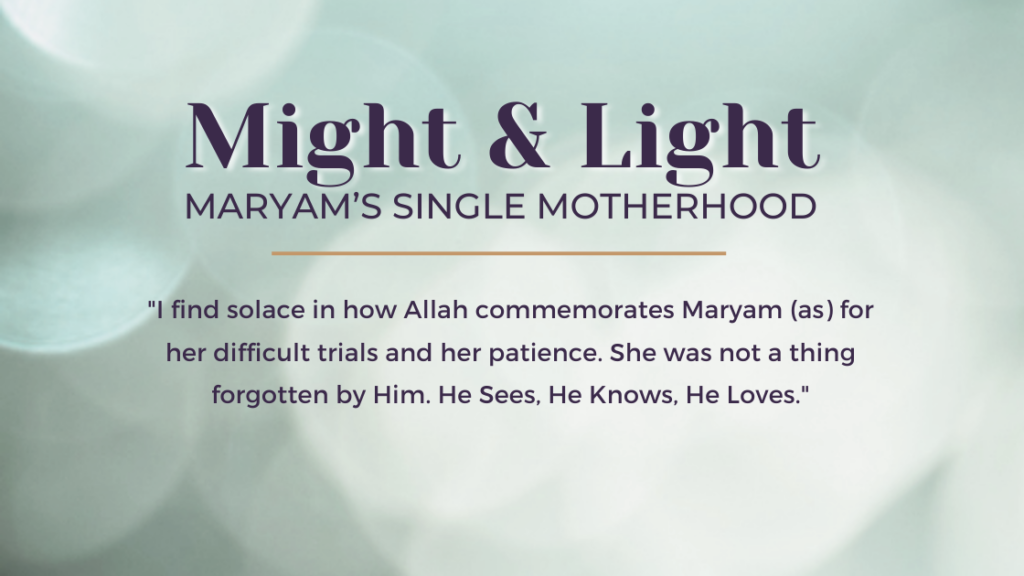This article was published as part of Masjid Rabata’s Annual Maryam (as) Seminar, Might and Light: Maryam’s Single Motherhood, December 2022.
Maryam (as) didn’t sign up for a birthing plan. And for those of us who suddenly, or gradually, find ourselves in the role of single motherhood know the pain that comes with shattered dreams of the home we envisioned for our young ones.
The grief is real. And the anxiety that comes with wanting to protect and provide safety for our children is one that is beautifully narrated in the Quran.
When Maryam returns to her people, after giving birth in isolation, she is fully aware that this would lead to social exile. But she was under the command of her Lord, and she relied on His plan, in complete submission, as did prophet Ibrahim (as).
She committed no sin, but hers was an ultimate trial. She endured slander, intense loneliness, and isolation, and she faced the possibility of execution.
Had it not been for the miraculous intervention of her baby, Prophet Isa (as), defending her in that intense moment we are aware as readers (or listeners) that her fate would not have boded well. We can wonder if she arrived as a man, baby in arms, whether she would she have gained a slandering mob at all.
وَلَيْسَٱلذَّكَرُكَٱلْأُنثَىٰ
“And the male is not like the female” (3:36) is the consolation given to her parents upon the birth of Maryam (as) when they were expecting the birth of a boy.
Grammarians have noted the use of similitude in this verse. In English, when we use similitude the object has the superlative characteristic. In other words, when we say ‘he is brave like a lion’ the object represents the epitome of bravery.
Another example of a mother in the Quran who endures intense anxiety in wanting to protect her child is the mother of Musa (as). As she places her child into a basket into the Nile, her state is described:
وَأَصْبَحَفُؤَادُأُمِّمُوسَىٰفَـٰرِغًا
“And the heart of Moses’ mother became empty [of all else]” (28:10). In other words, this was such a traumatizing experience for her that she went into shock.
The ayah continues “she was about to disclose [the matter concerning] him, had We not bound fast her heart that she would be of the believers.” (Qur’an 28:10).
Allah Himself narrates the difficulty these mothers experience in their trials despite their patience and the obedience to their Lord.
For those of us who are single mothers, in our contemporary world, we know too well the dread of making applications for housing knowing that we will likely be denied. We are, too, familiar with the judgmental assumptions about our situations and learn to navigate our terrain with grace and dignity.
In Medieval Old English poetry, the theme of the ‘wanderer’ is a prominent one. We see laments of individuals who were exiled from the tribe and the mental suffering they experienced as a result.
In other words, to be cut off from the tribe, their community, ultimately meant death. It was very difficult to survive a harsh terrain – the wilderness – without one’s tribe. Thus, we are hard-wired to belong. That gut-wrenching feeling that we feel upon being harshly shunned by society is likely thousands of years of evolution wired into the brain.
And, sometimes amidst all this we are also navigating the difficulties that come with watching our children deal with sociopathic personalities drunk on power. These archetypes are narrated in the Quran as consolation to us. There is no bigger sociopath drunk on power than Pharoah in the time of Musa (as). That a human (fir’awn) would commit genocide against infant boys for fear of losing his power in unfathomable. And we should take consolation in the archetypes that Allah maps out for us in the Quran.
The trials that we endure are not personal. They are impersonal, yet, Allah allows us to cultivate very personal relationships with Him, through these archetypal patterns. We endure these trials not because we are sinful and held in contempt by God, but because He Knows the archetypal patterns of behavior that exist in the world, and He is rooting for His beloved creation.
لَيْتَنِيمِتُّقَبْلَهَـٰذَاوَكُنتُنَسْيًامَّنسِيًّا
Enduring anxiety in times of extreme difficulty doesn’t make us weak in faith. It is merely to be human. We know through the words of Allah, Himself, that she (Maryam as) said: “Would that I had died before this, and had become a thing forgotten, completely forgotten!” (Maryam 19:23)
We know that she wished for death because Allah Himself recounts this to us. Did Allah, in His full Majesty, love Maryam during her difficult trial and in her moment of despair? He does. He loved her throughout her trial. And her trial was an extremely difficult one.
Did Allah know the anxiety this would induce? He did. And as a reward He, in His Majesty, made the world make dhikr of her until the end of time and eternity by narrating her story and making mention of her in the Heavens and the Earth.
There are times, as single mothers, when we feel it is not possible to fulfil the enormous responsibility placed on our shoulders, and some days feel more difficult than others. In those moments we ask Allah to strengthen our hearts like He did with the mother of Musa (as), and we ask that He provide sustenance for us like He did for Maryam (as) and we ask that He make our offspring from among the Saliheen.
He Knows the trials that we face as women, and He Knows that they are different. We should take comfort in the fact that Maryam (as) is the only woman mentioned by name in the Quran and she so happens to be a single mother. I find solace in how Allah commemorates Maryam (as) for her difficult trials and her patience. She was not a thing forgotten by Him. He Sees, He Knows, He Loves.
Ribaat Student



